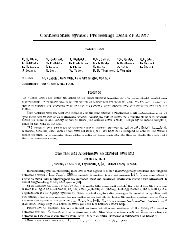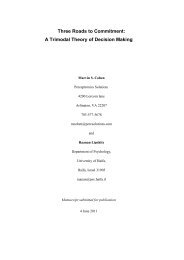Three Roads to Commitment: A Trimodal Theory of Decision Making
Three Roads to Commitment: A Trimodal Theory of Decision Making
Three Roads to Commitment: A Trimodal Theory of Decision Making
You also want an ePaper? Increase the reach of your titles
YUMPU automatically turns print PDFs into web optimized ePapers that Google loves.
<strong>Three</strong> <strong>Roads</strong> <strong>to</strong> <strong>Commitment</strong>: A <strong>Trimodal</strong> <strong>Theory</strong> <strong>of</strong> <strong>Decision</strong> <strong>Making</strong> 54<br />
Dennett, D. C. (1978). Why the Law <strong>of</strong> Effect will not go away. In Brains<strong>to</strong>rms: philosophical essays on mind and<br />
psychology. Montgomery VT: Bradford Books.<br />
Dennett, D. C. (1996). Darwin's Dangerous Idea: Evolution and the Meanings <strong>of</strong> Life. New York: Touchs<strong>to</strong>ne<br />
Books.<br />
Dosi, G., Marengo, L., Bassanini, A., & Valente, m. (1998). Norms as emergent properties <strong>of</strong> adaptive learning: The<br />
case <strong>of</strong> economic routines. In P. A. Danielson (Ed.), Modeling Rationality, Morality, and Evolution (pp.<br />
442-63). Oxford: Oxford University Press.<br />
Dubra, J., Maccheroni, F., & Ok, E. A. (2004). Expected utility theory without the completeness axiom. Journal <strong>of</strong><br />
Economic <strong>Theory</strong>(115), 118-133.<br />
Einhorn, H. J., & Hogarth, R. M. (1985). Ambiguity and uncertainty in probabilistic inference. Psychological<br />
Review, 92(4), 433-461.<br />
Ellsberg, D. (1988). Risk, ambiguity, and the Savage axioms. In P. Gardenfors & N.-E. Sahlin (Eds.), <strong>Decision</strong>,<br />
probability, and utility: Selected reasoning (pp. 245-69). Cambridge, UK: Cambridge University Press.<br />
Elster, J. (1974). Ulysses and the sirens: Studies in rationality and irrationality. Cambridge, Ma: Cambridge<br />
University Press.<br />
Elster, J. (2000). Ulysses unbound. Cambridge, MA: Cambridge University Press.<br />
Endsley, M. (1995). Toward a theory <strong>of</strong> situation awareness in dynamic systems. Human Fac<strong>to</strong>rs, 37(1), 32-64.<br />
Endsley, M. R. (2000). Theoretical underpinnings <strong>of</strong> situation awareness: A critical review. In M. R. Endsley & D.<br />
J. Garland (Eds.), Situation awareness analysis and measurement (pp. 3-32). Mahwah, NJ: Erlbaum.<br />
Ericsson, K. A., Krampe, R. T., & Tesch-Romer, C. (1993). The role <strong>of</strong> deliberate practice in the acquisition <strong>of</strong><br />
expert performance. Psychological Review, 100(3), 363-406.<br />
Ericsson, K. (2005). Superior decision making as an integral quality <strong>of</strong> expert performance: Insights in<strong>to</strong> the<br />
mediating mechanisms and their acquisition through deliberate practice. In H. Montgomery, R. Lipshitz & B.<br />
Brehmer (Eds.), How Pr<strong>of</strong>essionals Make <strong>Decision</strong>s (pp. 135-67). Mahwah, NJ: Lawrence Erlbaum Associates.<br />
Etzioni, A. (2000). Social norms: Internalization, persuasion, and his<strong>to</strong>ry. Law & Society Review, 34(1), 157-178.<br />
Etzioni, A. (1988). The Moral Dimension: Toward a new economics. New York: The Free Press.<br />
Evans, J. S. T. (2007). Hypothetical Thinking: Dual Processes in Reasoning and Judgment. New York: Psychology<br />
Press.<br />
Fiedler, K., & Juslin, P. (Eds.) (2006). Information Sampling and Adaptive Cognition. Cambridge, UK: Cambridge




